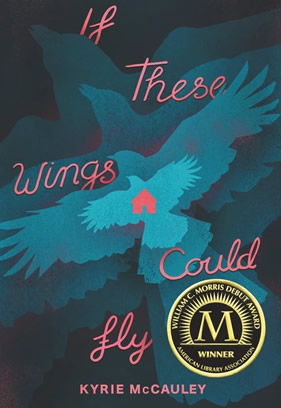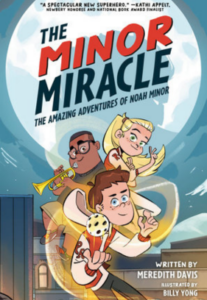Tens of thousands of crows are gathering in Auburn, Pennsylvania. It’s strange, unexplainable and almost magical. And it has the townsfolk worried.
To 17-year-old Leighton Barnes, however, that’s one of the least bothersome things going on in her world lately. In fact, she finds the swarming crows almost comforting in some odd way. There’s one gray crow that comes tapping at her bedroom window, whom she’s nicknamed Joe, that seems incredibly smart and friendly. It even leaves little gifts of marbles and rusty keys for Leighton’s little sister when she gives him crackers and peanuts.
The things that frighten Leighton, however, are much closer to home. There’s a fearsome, dangerous, angry thing that walks around in her father’s shoes, for instance. With every new bill or missed payment or lost job opportunity, her dad’s anger bursts forth in raging, destructive ways. He hasn’t broken any bones in the house yet. But he’s erupted and flared, screamed and bruised, broken plaster and glass. This explosive temper has driven Leighton’s two young sisters, Campbell and Juniper, into her arms for safety more times than Leighton can count. It’s gotten to the point where that explosion is expected. And it always comes.
And then there’s the gun Dad keeps on top of the refrigerator. When the house starts to rage, Leighton’s thoughts always go to the gun and, of course, her mom. Leighton’s longsuffering mother is the only fragile, fleshy obstacle between that gun and the really fragile things huddling together in the bedroom upstairs.
Worse than even that, in a way, is the fact that no one wants to see the terrible situation that the female Barnes family members must endure. Even their house conspires against them—magically repairing the cracked plaster walls, the smashed windows, splintered door jambs and fractured cabinets before anyone might see them and hold them up as proof.
Leighton is in her last year of high school. And she’s working toward the day when she can fly off away from her father’s rages. On the other hand, she also worries about leaving this family nest, no matter how terrible it might be. Because when she flies free, her sisters will stay behind with no wings to fly for cover.
Leighton has to find some answer that currently eludes her: She must come up with some way to protect the ones she loves most. Her thoughts and fears swirl like a sky full of crows. They crowd her mind like the black flocks of Auburn crowd the trees.
There has to be a way. And Leighton has to find it.











